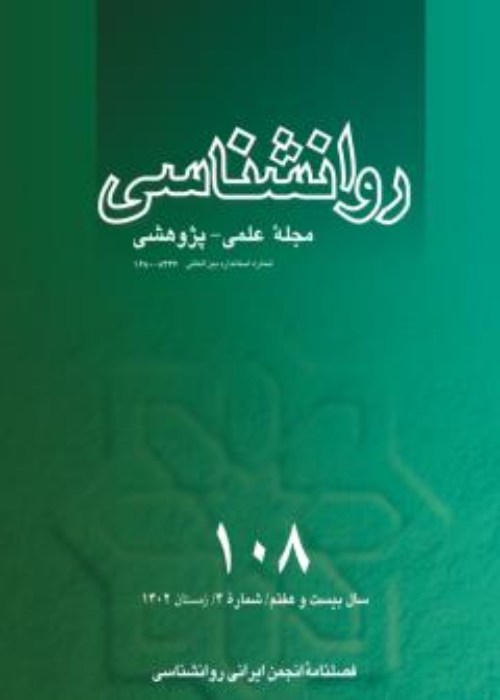فهرست مطالب
فصلنامه روانشناسی
سال هفتم شماره 3 (پیاپی 26، تابستان 1382)
- تاریخ انتشار: 1382/06/01
- تعداد عناوین: 8
-
-
صفحه 207
-
Page 98This study aims to compare the Locus of Control, Motivational beliefs, andSelf-Regulated Learning Strategies in a group of university students. UsingStratified random sampling method, 383 students were selected and participated inthe study. All participants completed the Motivated Strategies for LearningQuestionnaire (MSLQ), the Rotter’s Locus of Control test (LOC), and ademographic questionnaire. In order to assess the participants’ academic success,their average of passes was used. Analysis of results indicate that: 1) students withExternal Locus of Control use motivational beliefs and Learning Strategies lessthan those with Internal Locus of Control, 2) The engineering-technical studentshave more powerful Motivational beliefs and use more Learning Strategies thanstudents in the human science and basic science faculties, 3) There was asignificant direct relationship between the use of motivational beliefs and Self-Regulated Learning Strategies in students and their academic success.
-
Page 112This study investigates the influence of the motivational belives on help-seekingand academic achievement. Tow hundred 9th grade boy students were randomelyselected and participated in the study. The motivational belives (Task-focusedgoals, extrinsic goals, relative ability goals, Perception of cognitive competenceand Perception of social competence) was measured by a developed questionnairas well as the Harter’s Perceived Competence Scale. The help-seeking behavior(adaptive help-seeking and avoidance of help-seeking) was measured by adeveloped questionnair. Students’ mean scores on their exams, were taken as themeasure of the students’ academic achievement. Results showed that task-focusedgoals and perception of social competence were the best predicting variables forthe adaptive help-seeking behavior. Extrinsic goals was the best predictingvariable for avoidance of help-seeking behavior. It was also revealed that the helpseekingbehavior (adaptive help-seeking and avoidance help-seeking), predictesacademic achievement. In general this study indicates the importance and effectiverole of the motivational-social factors in the student’s help-seeking and academicperformance
-
Page 127This research examine the effectiveness of problem-sloving skills Training on reduction of depression in 15-18 years old adolescents. To evaluate theeffectiveness of this method in treatment of depression, pre-test and post-test planwas performd on the control group. At first 300 students were selected from 1400students on a random basis. Then Beck Depression Inventory were administeredon them. Thirty students were chosen from those who had a minimum score of 17and randomly divided into two control and experimental groups. The experimentalgroup recieved Problem-Solving Skills Training and the control group did notrecieve any intervention. Results revealed that, for the experimental group,depression was reduced significantly (p<0/001), Therefore, Problem-SolvingSkills Training is a useful intervention for reducing depression as well asincreasing effective coping skills, i.e. more problem-focus coping skills.
-
Page 143To study the effect of passive music and self stimulated movements on contrallingaggression in mild mental retarded children, and to compare the effect of music onmild mental retarded girls and boys, 40 students (20 girls & 20 boys) from fiveexceptional schools in karaj were selected. Piaget’s conservation test, Raven’schildren test and Rosenzweg’s Frustration Test were admiristered on all subjects.Children were randomly divided into 2 control groups and 2 exprimental groups.The music was represented to the exprimental groups for 50 days (3 time per week,75 min per session). The children were alloweded to use self stimulated rhythmicalmovements, when they were listening to the music. After completing treatmentprogram all subjects were retested by the Rosenzweig’s Frustration Test. It wasfound that passive music and self-stimulated movements had a significant effect oncontrolling aggression. There was no significant difference between two sexs.
-
Page 153Mississippi Scale is a well- known Scale for measuring the severity of posttraumatic stress disorder (PTSD). In order to study the reliability and validity ofthis scale, it was translated into Persion and then back translated to English assuggested by Brislin, Lonner and Throndike (1973). The Persian version wascalled “Eshel”. 69 patients with PTSD, 41 patients with anxiety disorders, 30patients with depression, 31 patients with obsessive compulsive disorders and 93nonpatients people participated in this study. All participants completed the Eshel,the PTSD Checklist, the Life Events Checklist and the Padua ObsessiveCompulsive Scale. The following results confirmed reliability and validity of theEshel: 1- Significant mean difference between the PTSD, anxiety and nonpatientgroups in favour of the PTSD group, 2- Significant correlation between scores inthe Eshel and the PTSD Checklist, the Life Events Scale and Padua Obsessive-Compulsive Scale, 3- High internal consistency coefficient (Alpha Coronbach) andtest-retest reliability. Performing a principal component analysis on the whole dataresults in extraction of four factors as follows: intrusive memories, interpersonalproblems, difficulty in emotional control and lack of depression.
-
Page 179The aim of this study was to evaluate relationships between Kolb’s learning styles and Witkin’s cognitive styles (field dependence and field independence) and thierrole in the students’ academic achievement. One hundred and four first-grade highschool girl students were randomly selected. The Kolb’s Learning Style Inventory(LSI) and the Witkins’s Group Embed Figures Test (GEFT) were administered onall participants. Pearson Regressions was preformed to ananlysis the data. Resultsshowed that there are significant and positive relationships between cognitivestyles, learning styles, abstract conceptualization and Mathematics and Englishachievements.


